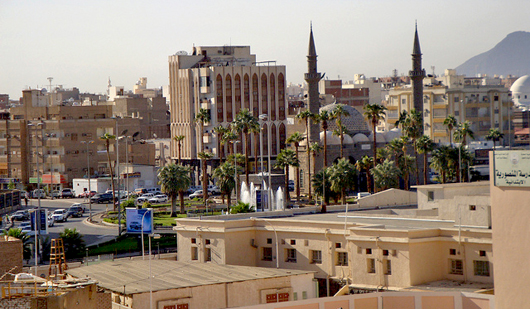Madinah, Oct 9: Work on the first phase of the SR50 billion King Abdullah Pilgrim City in Madinah has begun as part of the government’s efforts to further improve services being extended to the guests of God who come for Haj and Umrah every year.
The massive city covering an area of over 1.6 million square meters will accommodate 200,000 people. It is located 3 km to the west of the Prophet’s Mosque, 3 km from Meeqat, and 900 meters from Quba Mosque.
“Custodian of the Two Holy Mosques King Abdullah has instructed the Finance Ministry to implement the project,” said Madinah Gov. Prince Faisal bin Salman, adding that it would boost pilgrim services in the city.
State-owned Public Investment Fund will finance the project, which includes a 400-bed hospital and a railway and bus station.
“A number of hotels and furnished apartments will be constructed as part of the world-class city to accommodate 200,000 pilgrims,” said Prince Faisal while thanking King Abdullah for approving the vital project.
A source at the Ministry of Finance, said the total cost of the giant project is expected to exceed SR50 billion. The first phase will cost SR3.3 billion while the second phase SR2.7 billion. The project will have 100 administrative and residential towers and 30 hotels apart from the Haj Ministry headquarters, the Haj secretariat, and the Madinah governor’s office.
It would help to provide better services for the guests of God, create thousands of local jobs and contribute to the social and economic development of the city.
The source said the project is one of several that are to be undertaken to develop Madinah, which would compensate for the number of properties demolished.
There would also be suites for businesspeople. Each hotel would have large reception halls with unique architectural designs, in addition to restaurants, coffee shops and business centers.
The city will house offices for the Supreme Haj Committee in Madinah, and administrative offices for Haj operators and Tawafa organizations, as well as offices for the General Syndicate of Cars, travel agents and medical missions with a capacity for 31,000 employees.
Lower floors have been allocated for parking. There would also be a big mosque on the southeastern side of the city to house 15,000 worshippers.
The bus station will have the capacity to transport 84,000 pilgrims to and from the Prophet’s Mosque. The commercial center is made up of three floors over 71,000 square meters, the source said.






Comments
Add new comment